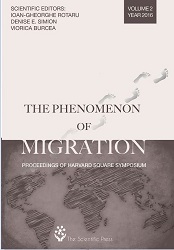The Concept of the ‘Elected’ People in the Abrahamic Religions
The Concept of the ‘Elected’ People in the Abrahamic Religions
Author(s): Tudor Cosmin Ciocan
Subject(s): Theology and Religion
Published by: Scientia Moralitas Research Institute
Keywords: jealousy; chosenness; elected people; hope; Judaism; Christianity; Islam; religious leaders; covenant; ousted; sovereignty; predestination; theopolitical nation
Summary/Abstract: The Divine election is certainly one of the more profound and controversial doctrines of religions, in every Holy Scripture and beyond. It certainly helped many wandering people, ranging from a place to another, in slavery, poverty or ousted by other. Also, it helped maintain loyalty to traditions; it brings hope for poor and meek, it implies divine protection and helps overcome the most severe social handicaps. The conception of chosenness has at the same time negative appointment regarding the others, non-chosen, and so it leads to moral and eschatological debates and paradoxes. How the most known religions—Judaism, Christianity, and Islam—relate to this concept, and what is their interpretation of this profound concept, we will try to build on the relationship of pilgrim people, expelled and ousted. For the biblical interpretation of the concept, we will see it as a separation among others but also with a special call in relation with them. The Christian side of it aimed at the beginning against the ultra nationalistic view of chosenness as in Judaism, then it gained the same facet as Israel, within the concept of predestination. For the Islamic part, the concept borrowed some issues from both previous religions, but also set its vision and application of it. What are the differences and mostly the circumstances that led to such conceptions—we will see during this paper.
Book: The Phenomenon of Migration
- Page Range: 282-303
- Page Count: 22
- Publication Year: 2016
- Language: English
- Content File-PDF

